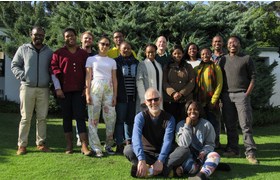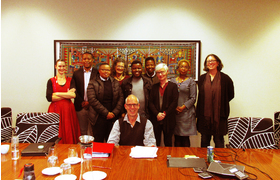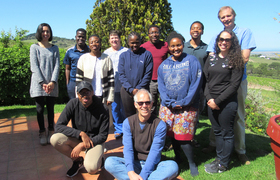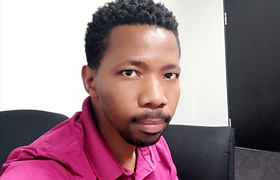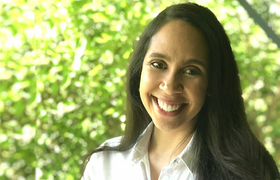Bianca Arendse: New nGAP lecturer
29 April 2020 | Story Bianca Arendse. Photo Supplied. Read time 3 min.
Bianca Arendse joined Organisational Psychology in the School of Management Studies in the Faculty of Commerce at the University of Cape Town (UCT) as a Phase 5 nGAP lecturer at the beginning of 2020. Although new to UCT, she joined an experienced nGAP team with Siphiwe Dlamini (Phase 2 lecturer and head of the marketing section) and Suki Goodman (head of school), both having laid the foundations for a supportive environment within the school.
Arendse was born and raised in Cape Town as the youngest of three siblings. Being the first in her family to have the opportunity and privilege to pursue a tertiary education is something that she’s deeply grateful for. She completed her under- and postgraduate studies at the University of the Western Cape (UWC), where she majored in industrial/organisational (I/O) psychology.
Arendse has always had an interest in understanding people dynamics and studying their behaviour. She was a very shy child and found her voice while at university. This change in behaviour intrigued her and she had an increasing need to understand people, their motives and behaviour.
Studies and work life
While completing her commerce degree, Arendse’s interest in the field grew significantly, which led her to train as a registered I/O psychologist. She completed her internship at the Western Cape Government, where she found a love for the public sector. Her role, as part of the psychological assessments team, entailed providing consultation services to 13 provincial government departments, with a focus on organisational development projects.
She served at provincial government for four years until the passion for continued learning resurfaced and led her to begin the next chapter of her journey at UCT. She applied for the nGAP position partly because of her enjoyment of the experience of being a tutor at UWC. The memories of that time rekindled the desire to be a student again, as well as to have the opportunity to learn to be a lecturer and interact with students. Her longing for academia was the drive and motivation behind applying for this position.
Academia and future plans
Arendse’s first three months proved to be quite an adjustment from government to academia, but she is enthusiastic about learning and acquiring new skills. Becoming an academic means, among other things, continuing her studies and pursuing a PhD.
Within the working environment, there is a focus on individuals with physical disabilities. Organisations respond positively and seek to accommodate and support those individuals. On the other hand, it seems that organisations are not fully equipped to accommodate individuals with invisible stigmatised identities. This speaks to minority groups within organisations and includes people living with HIV or AIDS, mental illnesses, and different socioeconomic classes and religions.
For this reason, Arendse plans to research the disclosure and management of invisible stigmatised identities within organisations.
She believes that nGAP is an excellent national initiative that provides people like her with an amazing opportunity to enter the academy and become established.
 This work is licensed under a Creative Commons Attribution-NoDerivatives 4.0 International License.
This work is licensed under a Creative Commons Attribution-NoDerivatives 4.0 International License.
Please view the republishing articles page for more information.
New Generation of Academics Programme (nGAP)
UCT has responded energetically to the New Generation of Academics Programme (nGAP), an opportunity provided by the Department of Higher Education (DHET) to build a new generation of black South African academics. The DHET’s 2015 vision document, “Staffing South Africa’s Universities Framework: A comprehensive, transformative approach to developing future generations of academics and building staff capacity”, proposes a suite of initiatives to address the challenge, with nGAP being the major instrument to increase the numbers of black South African academics.
The programme “involves the recruitment of highly capable scholars as new academics, against carefully designed and balanced equity considerations and in light of the disciplinary areas of greatest need”. The nGAP scholars are appointed into permanent positions where from the outset their conditions are customised to ensure their successful induction into the ranks of established academics.
The DHET provides funding over a six-year period to support the appointment of an nGAP lecturer, and their time is protected to provide the best possible opportunity for the completion of a doctorate degree in the shortest possible time. Once the degree is completed, the nGAP lecturer’s teaching commitments are steadily increased until they shoulder a full teaching load.
Since the first advertisement for nGAP posts in 2015, UCT has been awarded 17 nGAP positions: 5 (Phase 1), 4 (Phase 2), 3 (Phase 3) and 5 (Phase 4). These are distributed across all faculties.
UCT’s nGAP scholars operate as a single cohort, managed and coordinated by Dr Robert Morrell. Lecturers meet for quarterly meetings, writing retreats and various capacity-building activities all designed to support the completion of postgraduate qualifications (particularly doctorates) and to develop records of achievement that will testify to their emergence as self-standing, excellent academics. Each lecturer is mentored by a senior scholar, who provides support and guidance on the challenges that routinely face academics.
The nGAP manager sets great store in building the cohesion of the cohort and encouraging the establishment of new UCT networks while producing a collaborative, mutually supportive and embracing work culture.
According to Dr Morrell, “This group of academics will lead UCT in 15 to 20 years’ time ... Their vision of excellence, of being African and South African, of serving a wider community and producing knowledge for the planet, the continent and the country, will power UCT in years to come.”
Newsletters
In the news




